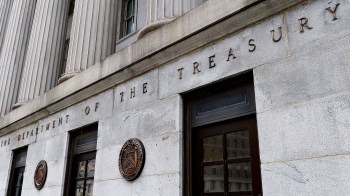I’m struggling with how we should proceed on the AIG bonus payouts. How much time, energy and money should go into stopping bonuses retroactively when the effort could be spent fixing the problem that allowed this to happen?
A lot of this bonus money has already been paid out. The President and the Treasury acknowledge the difficulty of getting it back. One of their solutions is to have AIG repay it as a condition of the company’s fourth bailout — $30 billion that AIG hasn’t received yet. The New York Times points out the flaw in this thinking:
By seeking to link repayment of the bonus money to the coming $30 billion in assistance, the administration seemed to leave open the possibility that the company would effectively be repaying taxpayers with taxpayer money. A Treasury official disputed that taxpayers would be repaying themselves, but could not specify how else the company would give back the money.
Bloomberg commentator Roger Lowenstein has a better suggestion. Renegotiate the contracts:
Pay a very modest portion now and give the employees a chit for the rest to be redeemed later. Employees who are unhappy with such a compromise can take it to a judge. AIG then would have the option of filing for bankruptcy, rupturing the contracts, and putting an end to the derivatives business for good.
The risk of lawsuits could be worth it. The courts might consider the extenuating circumstances here, like the fact that these contracts would be worthless if the taxpayers hadn’t bailed out AIG. Another solution – Congress is talking about imposing a 100% tax on the bonuses. This seems like a quick, easy remedy, but it might set a dangerous precedent.
Dealbook’s Andrew Sorkin makes a case for just letting the bonuses go. For one thing, he says AIG may need these derivatives people to untangle the mess they created:
So as unpalatable as it seems, taxpayers need to keep some of these brainiacs in their seats, if only to prevent them from turning against the company. In the end, we may actually be better off if they can figure out how to unwind these tricky investments.
Maybe, but where are they going to go? Who’s hiring derivatives “experts” right now?
If there’s a way to resolve this without spending a ton of money in court or wasting time, I’m all for it. Otherwise, let’s focus on preventing this from happening again. The Journal cites a new economic paper that suggests awarding bonuses in “dynamic incentive accounts:”
…top managers’ compensation would be placed into escrow accounts that would be invested in company stock and cash. Each month the account would be rebalanced, so if it were 60% in stock, and the company’s stock price fell, cash would be drawn down in the account to buy more stock. This would ensure that managers had skin in the company’s stock price even after the firm’s value fell. And it would take away the common problem of managers’ stock options getting repriced lower after a decline, which in essence rewards them for failure.
The IMF just issued a report that says bonuses should be paid out over a longer time period: “An early priority should be to delink bonuses from annual results and short-term indicators.”
These are good suggestions because if the President and the Treasury Secretary aren’t careful, Wall Street’s going to sneak an even worse pay structure by them. The Journal says Citigroup, Morgan Stanley and other financial companies are talking about increasing base pay to work around new bonus limits tied to TARP money. From the article:
Under the forthcoming rules, bonuses could come to no more than one-third of the total annual compensation paid to employees covered by the restrictions. Some compensation experts view the bonus limits as a mistake that turns the notion of pay for performance on its head, despite Wall Street’s culpability for the recession and credit crisis.
Then again, it’s possible that fat bonuses tied to revenue only encouraged Wall Streeters to take crazy risks. There has to be a way to incentivize healthy success instead of potentially destructive risk-taking.
There seems to be no rational explanation for AIG’s derivatives people getting bonuses when the company lost $99 billion last year. But the system in place now allowed it to happen.
There’s a lot happening in the world. Through it all, Marketplace is here for you.
You rely on Marketplace to break down the world’s events and tell you how it affects you in a fact-based, approachable way. We rely on your financial support to keep making that possible.
Your donation today powers the independent journalism that you rely on. For just $5/month, you can help sustain Marketplace so we can keep reporting on the things that matter to you.


















